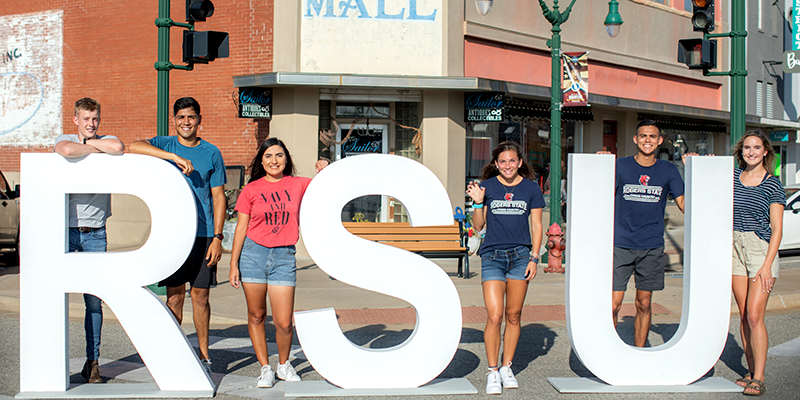
Accommodations are provided for people who are eligible to attend, enroll or benefit from the University’s programs, services, and activities. Accommodations are provided on an individual basis dependent on the need for services, request for reasonable accommodations, and documentation of disability.
Examples of reasonable accommodations include:
Volunteer note takers: A peer volunteer system of note takers is used at the University. The faculty will ask a student in class to volunteer to take notes. These notes may be photocopied or the student with a disability can use carbonless paper provided by Student Disability Services. It is the student’s responsibility to pick up this carbonless paper from the Office of Student Affairs prior to classes and deliver it to the note taker. If the student chooses to photocopy notes, the note taker and student must agree on how to proceed. Students are encouraged to take their own notes and use the notes from the note taker as supplemental material. Note takers are not a substitute for class attendance.
Tape recording privileges: A student with a qualified disability may be approved to use a tape recording device in classes. A limited number of tape recorders are available from Student Disability Services. The student must sign an equipment agreement to check out a recording device. If the device is not returned, the student will be billed for the replacement cost. It is the student’s responsibility to inform the professor prior to class that a tape recording device will be used. Tape recording devices are not a substitute for class attendance.
Accessible computer labs: The Stratton Taylor Library is equipped with an accessible computer for use by students with a qualified disability.
Alternative testing: Extended test time, distraction free testing and orally proctored exams are available in the Testing Center. Students should inform their professors and instructors that they are approved for alternative testing. Most of the time, the test will be given at the same time as the course period. There are times when this schedule will conflict with another class period. To schedule another time, please discuss with your professor and contact the Testing Center.
Permission to use a dictionary or spell checker: There may be times when a student with a disability is approved to use a dictionary or spell checker in a class or during an exam. Students are responsible for providing their own dictionary or spell checker and must discuss this with the professor or instructor prior to class.
Course substitutions: There may be times when a student desires a course substitution. Course substitutions may not alter the basic nature of the academic degree or academic requirements approved by the University. Requests for course substitution may be made through the Director of Student Development. Courses substitution must be approved by the Department Head or Dean of a particular school and the Vice President for Academic Affairs.
Written materials in alternative formats: A student with a disability may request written materials in alternative formats (e.g., books on tape, enlarged materials, etc.). Students requesting this accommodation must leave ample time for such materials to be purchased or provided. Students are strongly encouraged to seek this accommodation several weeks prior to the beginning of a course.
Counseling referrals: RSU provides counseling services to enrolled students. These services are provided free of charge to students.
Tutor referrals: Math tutoring through the college algebra level, as well as reading and writing, is provided through the Developmental Studies Tutoring Lab. Please contact this office at (918)343-7828 or (918)343-7648. Math tutoring beyond the college algebra level, as well as physical sciences, is available through the Department of Mathematics & Physical Science. Please contact their departmental office at (918)343-6812. Tutoring for biology is available through the Department of Biology. Please contact their departmental office at (918)343-7695.
Interpreting services: Student Development provides interpreting services as a reasonable accommodation for students who qualify on the basis of deafness or hearing impairment. RSU hires highly qualified interpreters. It is important to request an interpreter early as arrangements often take several weeks.
Accessibility: RSU strives to provide architectural accessibility for students with a disability. During inclement weather or times of construction, students with a disability are requested to contact Student Disability Services for assistance.
Handicap parking: Students with a disability who have been issued a handicap tag by the Oklahoma Department of Transportation may use the marked handicap parking spaces on campus.
Preferential seating: A student with a disability may request preferential seating as appropriate to the diagnosis. Preferential seating may include choosing a seat near the front of the class or by the door so a student may utilize frequent breaks without disruption.
Emotional support animal: Students who have an emotional support animal, not a pet, should inquire about the approval process with the Student Disability Services Coordinator at 918-343-6828 or [email protected] before their animal will be allowed on campus. Emotional support animals are not considered service animals under the ADA.
Service animal: If you require a service animal to be with you while you attend classes, navigate campus, live in housing, et cetera, please consider letting the Student Disability Services Coordinator know at 918-343-6828 or [email protected] so as to maintain a voluntary registry for emergency evacuation purposes. Currently the ADA only recognizes dogs and miniature horses as service animals. Please be aware that due to space constraints in RSU housing and some classrooms, miniature horses and extremely large sized dogs may not be able to be accommodated fully. Service-animals-in-training are not given the same allowances as fully-trained service animals under the ADA. Please note that there are individuals and organizations that sell service animal certification or registration documents online. These documents do not convey any rights under the ADA and the Department of Justice does not recognize them as proof that the dog is a service animal.
